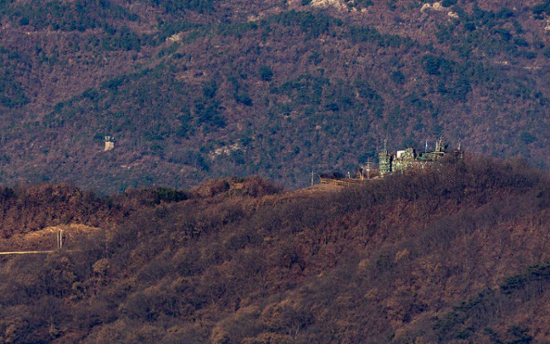Prime Minister Han Duck-soo, center, and Vice Defense Minister Kim Seon-ho, right, attend an enshrinement ceremony for discovered remains of 1950-53 Korean War troops at Seoul National Cemetery, Dec. 12. Yonhap
President Yoon Suk Yeol’s parliamentary impeachment Saturday sparked concerns over the readiness of the military against North Korean threats as it now faces an unprecedented gap in its top leadership.
Earlier in the day, an impeachment motion against Yoon over his failed Dec. 3 declaration of martial law passed at the National Assembly, suspending his presidential powers, including his control over the military as the commander-in-chief.
Yoon’s powers will be handed over to the acting president — Prime Minister Han Duck-soo — in a first since 2016 when then President Park Geun-hye was impeached.
As the military will now be led by an acting president and an acting defense minister, concerns have emerged over North Korea possibly perceiving the situation as a vacuum in military leadership and engaging in provocative acts to escalate tensions.
Vice Defense Minister Kim Seon-ho currently serves as the acting defense chief after former Defense Minister Kim Yong-hyun resigned from office and was subsequently arrested over his role in the short-lived imposition of martial law.
The situation is further complicated by a transitional period in the U.S. military leadership in South Korea, with Gen. Paul LaCamera, commander of the U.S. Forces Korea, to be replaced by his successor Gen. Xavier Brunson next week.
A number of top South Korean commanders have also been suspended from their duties over their alleged role in the martial law imposition, raising further questions over the country’s defense readiness.
As of Thursday, six generals had been suspended from their duties, including the head of the Army, the Capital Defense Command and the Special Warfare Command.
Despite the apparent leadership vacuum of some key units, the military has said there are no issues with its overall readiness posture.
On Friday, the Joint Chiefs of Staff said most of the suspended commanders led units mostly tasked with counterterrorism, and are not related to frontline forces that would immediately face North Korean troops in a contingency.

The inter-Korean border area near Yeoncheon, Gyeonggi Province is seen in this file photo. Yonhap
As part of efforts to maintain readiness, acting minister Kim held video talks with LaCamera on Thursday in a show of solidarity between the allies.
During the talks, LaCamera told Kim that his troops remain prepared to respond to external threats, vowing to work to “mitigate any risks” to the two sides’ planned combined training activities.
With Yoon’s impeachment, Kim is likely to hold talks with LaCamera again to reaffirm the alliance’s unity even in the face of domestic political turmoil.
Kim is also expected to convene a meeting of top military commanders to inspect troop readiness against North Korean threats.
After Park’s impeachment and that of President Roh Moo-hyun in 2004, the military immediately held a meeting of top commanders as well as talks with senior U.S. military officials.
Since the declaration of martial law, the South Korean military has yet to detect any unusual signs of North Korean military activity.
However, it is expected to deploy more reconnaissance assets to monitor the North amid persisting concerns Pyongyang could attempt to take advantage of the political situation with military activity. (Yonhap)


